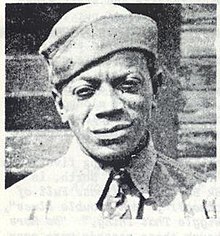Jaybird Coleman
Jaybird Coleman | |
|---|---|
 | |
| Background information | |
| Birth name | Burl C. Coleman[1] |
| Born | May 20, 1896 Gainesville, Alabama, United States |
| Died | January 28, 1950 (aged 53) Tuskegee, Alabama, United States |
| Genres | Country blues |
| Occupation(s) | Instrumentalist, singer |
| Instrument(s) | Harmonica, guitar |
| Years active | 1926 – late 1940s |
| Labels |
|
Burl C. "Jaybird" Coleman (May 20, 1896 – January 28, 1950)[1] was an American country blues harmonica player, vocalist, and guitarist.[2] He was a popular musical attraction throughout Alabama and recorded several sides in the late-1920s and early-1930s.
Biography
Coleman was born to a family of
physical labor, he was exposed to musical influences from his fellow sharecroppers in singing and discovering traditional folk songs.[2]
At age 12, he was introduced to the harmonica, in large part teaching himself, and was encouraged by his parents to hone his skills as an alternative to their wearying occupation. He performed locally for small wages at dance halls and parties.
In 1914, upon the outbreak of the
First World War, Coleman joined the United States Army and was stationed at Fort McClellan for the entirety of the conflict. At the fort, he developed a reputation for being stubbornly independent, often disobeying the Army's strict code of conduct.[4] As a result, his superior officers would call him Jaybird, a nickname associated with him for the rest of his life. During this time Coleman first performed for large crowds as he entertained his fellow soldiers. After his military discharge, he briefly returned to Gainesville, working for a few months as a farm labourer, before relocating with his younger brother, Joe, to Bessemer, Alabama, and becoming a full-time musician.[5]
In 1922, Coleman teamed up with the singer and guitarist
gospel songs. As a blues musician, Coleman was popular with black and white audiences alike. Occasionally he would play a harmonica as he strolled through the streets, drawing a crowd that followed him.[7]
In 1926, Coleman began recording for
OKeh Records and Columbia Records. In 1930, he recorded "Coffee Grinder Blues" for Columbia, which, in a dispute with the label over payment, he blocked from wider release. It is his rarest record.[5]
Coleman continued to perform on street corners in Alabama throughout the 1930s and 1940s. By the end of the 1940s, he disappeared from the music scene.
He died of cancer on January 28, 1950, in Tuskegee, Alabama.[9]
Compilation
- Jaybird Coleman & the Birmingham Jug Band, Complete Recorded Works in Chronological Order: 1927–1930 (Document, 1992)
References
- ^ ISBN 978-1-135-95832-9.
- ^ ISBN 978-0-8154-1020-1.
- ISBN 978-1-61312-252-5.
- ^ Erlewine, Stephen. "Jaybird Coleman – Biography". AllMusic. Retrieved August 6, 2015.
- ^ a b Jaybird Coleman (1927–1930) (CD booklet). Document Records. 1993.
- ^ ISBN 9781461661023.
- ^ Oliver, Paul (2001). Yonder Come the Blues: The Evolution of a Genre. Cambridge University Press. p. 156.
jaybird coleman.
- ^ Owens, Thom. "Jaybird Coleman (1927–1930) – Review". AllMusic. Retrieved August 6, 2015.
- ISBN 978-0-87930-736-3.
